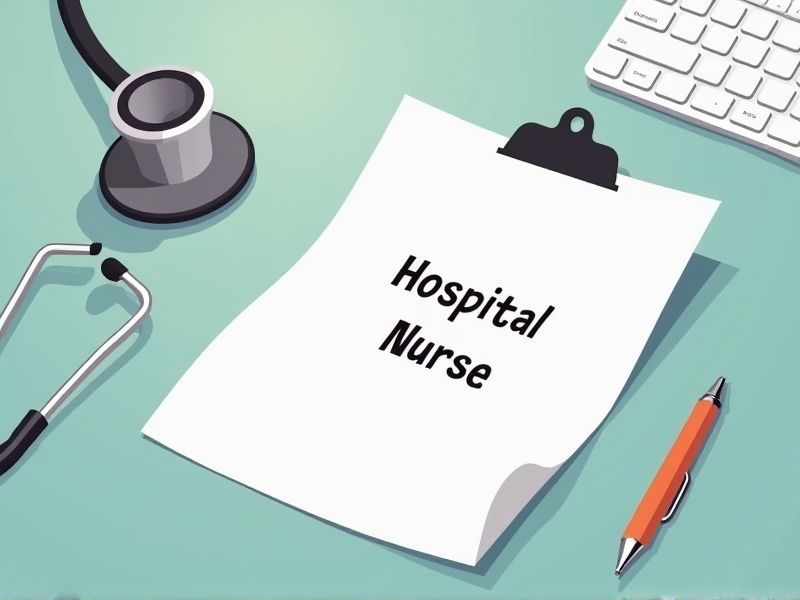
Hospital nurses face complex medical situations that require specialized knowledge and skills; certifications provide this advanced training. Holding specific certifications can enhance a nurse's ability to deliver high-quality patient care and improves job security and career advancement opportunities. Certifications also ensure adherence to current healthcare standards and practices, boosting patient safety and professionalism. Here are some essential certifications you may need as a hospital nurse.
Registered Nurse (RN) License
A Registered Nurse (RN) license ensures that hospital nurses have met standardized education and competency requirements, which is crucial for patient safety. This licensing process verifies a nurse's ability to provide appropriate and effective care in a high-stakes hospital environment. An RN license distinguishes qualified healthcare professionals, enhancing trust among patients and colleagues. Legal regulations require hospital nurses to have an RN license to practice, reducing liability and protecting both the institution and the patients.
Basic Life Support (BLS) Certification
Basic Life Support (BLS) Certification equips hospital nurses with the skills to perform CPR efficiently, improving patient survival rates during cardiac emergencies. This training ensures nurses can recognize life-threatening situations, facilitating timely intervention and care. BLS certification also aligns with hospital compliance standards, reducing liability and enhancing overall patient safety. Regular recertification fosters skill retention, ensuring that nurses remain prepared to manage critical incidents effectively.
Advanced Cardiac Life Support (ACLS) Certification
Hospital nurses with Advanced Cardiac Life Support (ACLS) Certification improve patient outcomes in cardiac emergencies by applying evidence-based protocols effectively. Hospitals see reduced mortality rates because ACLS-trained nurses can administer medications and initiate life-saving procedures promptly. Certification ensures that nurses are well-equipped to respond quickly during critical situations, minimizing response time in cardiac arrests. Nurses with ACLS training also enhance teamwork among healthcare providers, fostering cohesive and efficient crisis management.
Pediatric Advanced Life Support (PALS) Certification
Pediatric Advanced Life Support (PALS) certification equips hospital nurses with the necessary skills to effectively respond to life-threatening pediatric emergencies, substantially improving patient survival rates. Mastery of PALS protocols helps in the early identification and management of critical conditions, reducing the likelihood of complications. Integration of this knowledge enhances team dynamics during pediatric resuscitation scenarios, promoting cohesive and efficient care delivery. Hospitals often mandate PALS certification to meet accreditation standards and ensure a high level of care for their youngest patients.
Neonatal Resuscitation Program (NRP) Certification
Hospitals require Neonatal Resuscitation Program (NRP) Certification for nurses to ensure they possess the necessary skills to handle neonatal emergencies effectively, which can significantly improve infant survival rates. With NRP training, nurses are equipped to follow standardized protocols during critical moments, minimizing the risk of errors. Having certified nurses in the neonatal unit builds confidence among healthcare teams and enhances overall patient safety. In emergency scenarios involving newborns, NRP-certified nurses can respond quickly and competently, often making a vital difference in outcomes.
Critical Care Registered Nurse (CCRN) Certification
The Critical Care Registered Nurse (CCRN) certification elevates a nurse's expertise in managing critically ill patients, impacting patient outcomes positively. Certified nurses exhibit advanced clinical judgment, which contributes to reduced mortality rates and enhanced recovery processes. Hospitals often prefer or require CCRN-certified nurses to ensure a high standard of care in intensive and critical care units. Gaining this certification can also lead to increased job opportunities and recognition within the nursing field, aligning with institutional goals for quality assurance.
Certified Medical-Surgical Registered Nurse (CMSRN) Certification
Hospitals require CMSRN certification for nurses to ensure they possess specialized knowledge in medical-surgical nursing, which enhances patient care quality. It indicates a nurse's commitment to maintaining standards and staying updated with the latest practices. Certified nurses often demonstrate improved clinical outcomes due to their in-depth understanding and skills. In many institutions, CMSRN-certified nurses qualify for leadership roles, impacting team dynamics and hospital operations positively.
Certified Emergency Nurse (CEN) Certification
Certified Emergency Nurse (CEN) certification often leads to improved patient care by verifying a nurse's competence in emergency situations. It can result in increased job opportunities as many hospitals prefer or require this credential for emergency department roles. Certified nurses tend to have higher confidence in their clinical skills, which can enhance overall workflow and stress management during critical events. Accreditation might incentivize hospitals to seek CEN-certified staff due to potential improvements in patient satisfaction and health outcomes.
Oncology Certified Nurse (OCN) Certification
The Oncology Certified Nurse (OCN) Certification equips nurses with specialized knowledge in cancer care, improving patient outcomes in oncology wards. Hospitals employing OCN-certified nurses may see enhanced patient satisfaction due to greater expertise in managing complex cancer treatments. This certification validates a nurse's commitment to ongoing education and professional development, aligning with hospitals' goals for high standards of care. Regulatory bodies and institutions often prefer or require certification to ensure that staff are competent in delivering evidence-based oncology care.
Infection Control Certification (CIC)
Hospitals need Infection Control Certification (CIC) for nurses to ensure they have the necessary expertise to prevent and manage healthcare-associated infections, which directly impacts patient safety. A certified nurse can contribute to reducing infection rates, resulting in lower healthcare costs and improved patient outcomes. The certification provides nurses with standardized knowledge and skills, aligning hospital practices with evidence-based guidelines. The presence of CIC-certified nurses can enhance a hospital's reputation, attracting more patients and potentially increasing the facility's funding and resources.
Summary
You can notice enhanced patient care quality when a hospital nurse obtains additional certifications. This upskilling often leads to greater trust from both patients and peers. Certified nurses have access to better career advancement opportunities. Hospital outcomes may improve due to the expertise and confidence these nurses bring to their roles.
